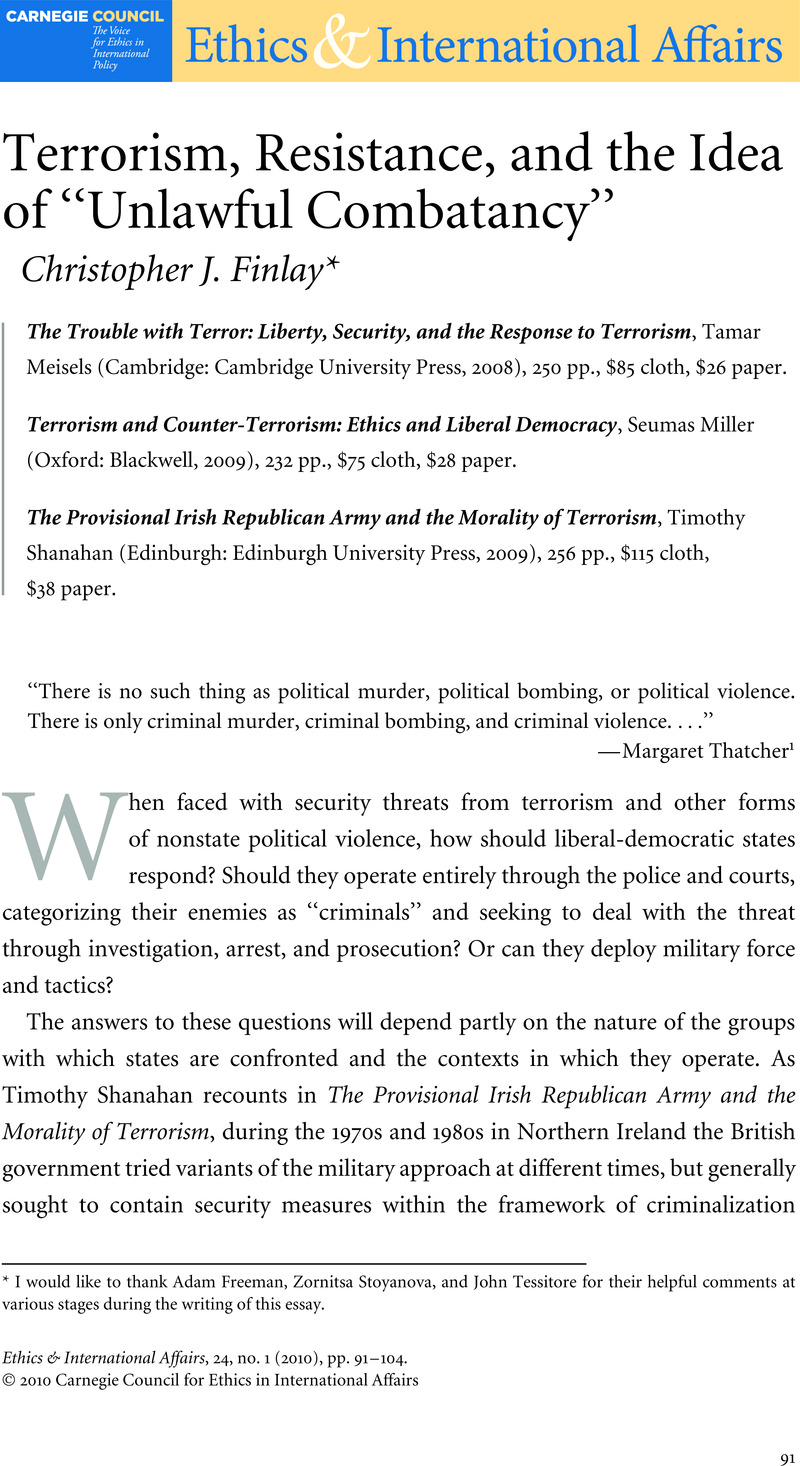Published online by Cambridge University Press: 25 March 2011

1 Margaret Thatcher speaking in reference to the IRA hunger strikes in 1981 quoted in Timothy Shanahan, The Provisional Irish Republican Army and the Morality of Terrorism (Edinburgh: Edinburgh University Press, 2009), p. 172.
2 Richard English, Armed Struggle: The History of the IRA (London: Pan Books, 2004), pp. 187–89.
3 Hence Margaret Thatcher's declaration: “Crime is crime is crime: It is not political, it is crime.” Shanahan, The Provisional Irish Republican Army, p. 172; see also pp. 190–91.
4 Ibid., pp. 190–91; and Seumas Miller, Terrorism and Counter-Terrorism: Ethics and Liberal Democracy (Oxford: Blackwell, 2009), p. 136.
5 Tamar Meisels, The Trouble with Terror: Liberty, Security, and the Response to Terrorism (Cambridge: Cambridge University Press, 2008), p. 91.
6 Ibid., p. 114 and chap. 5.
7 Miller, Terrorism and Counter-Terrorism, p. 85.
8 Ibid., pp. 84, 86, 123, 134.
9 See, e.g., ibid., p. 133.
10 See ibid., pp. 99–102.
11 Meisels, The Trouble with Terror, p. 115. Daniel Statman frames his defense of targeted killing in the terms of military engagement without elaborating a special unlawful combatant category to do so. See Daniel Statman, “Targeted Killing,” Theoretical Inquiries in Law 5, no. 1 (2004), pp. 179–98, at pp. 181–88. Both Meisels and Statman respond to Michael Gross's critique, “Fighting by Other Means in the Mideast: A Critical Analysis of Israel's Assassination Policy,” Political Studies 51 (2003), pp. 350–68.
12 Meisels, The Trouble with Terror, p. 136.
13 Ibid., p. 117; and Statman, “Targeted Killing,” p. 195. Meisels cites the opinion of Israeli Supreme Court Justice Aharon Barak for legal reasoning concerning the status of “civilians who are unlawful combatants”; see Meisels, The Trouble with Terror, p. 142.
14 See, for instance, Meisels, The Trouble with Terror, p. 164: “The lawless status of irregular combatants ought to be legally distinguished from their lawful counterparts by explicitly denying irregular combatants the conventional rights of soldiers.”
15 Meisels defines “terrorism” as the deliberate violation of noncombatant and civilian immunities for political purposes, generally involving an element of terror (The Trouble with Terror, chap. 1). Miller argues that terrorism should imply forms of violence that “ought to be criminalised” when “committed in order to terrorize a third party and in the service of military or political ends.” Not all targeting of noncombatants, as he argues in Terrorism and Counter-Terrorism (chap. 3 and p. 83), would necessarily fall within the category, as some might conceivably be justified legally. On definition, see pp. 58, 83, chap. 2, and throughout. Compare Christopher Finlay, “How to Do Things with the Word ‘Terrorist,”’ Review of International Studies 35, no. 4 (2009), pp. 751–74.
16 George Fletcher, Romantics at War: Glory and Guilt in the Age of Terrorism (Princeton: Princeton University Press, 2002), p. 107. Quoted in Meisels, The Trouble with Terror, p. 105.
17 Meisels, The Trouble with Terror, p. 104.
18 Ibid. Compare Michael Walzer, Just and Unjust Wars: A Moral Argument with Historical Illustrations, 4th ed. (New York: Basic Books, 2006), chap. 11.
19 Meisels, The Trouble with Terror, p. 124.
20 Walzer, Just and Unjust Wars, p. 183.
21 Notwithstanding the experience of political inmates in Northern Ireland under the Good Friday Agreement.
22 Miller, Terrorism and Counter-Terrorism, p. 85.
23 Ibid., p. 86.
24 Ibid., p. 85.
25 Ibid., p. 84.
26 Ibid., pp. 135–37.
27 See Shanahan, The Provisional Irish Republican Army, pp. 191–92.
28 Miller, Terrorism and Counter-Terrorism, pp. 135–37.
29 Ibid., p. 117.
30 Karma Nabulsi, Traditions of War: Occupation, Resistance and the Law (New York: Oxford University Press, 1999).
31 Fletcher, Romantics at War, p. 109; and Meisels, The Trouble with Terror, p. 110.
32 See Christopher Finlay, “Legitimacy and Non-State Political Violence,” Journal of Political Philosophy (forthcoming). On problems with applying jus in bello standards to terrorists and other nonstate groups, see Robert E. Goodin, What's Wrong with Terrorism? (Oxford: Polity Press, 2006), pp. 15–16.
33 This problem is particularly pertinent to the claims the PIRA made about being an army, as I argue in “Legitimacy and Non-State Political Violence.” See, for instance, Shanahan, The Provisional Irish Republican Army, pp. 172, 190–91. On the liabilities in law of those who are regarded as “civilians” but who are captured having engaged in military activities, see Knut Dörmann, “The Legal Situation of ‘Unlawful/Unprivileged Combatants,”’ International Review of the Red Cross 85 (2003), pp. 45–74.
34 Miller, Terrorism and Counter-Terrorism, p. 118, as reflected in the Protocols I & II Additional to the Geneva Conventions, 1977, on which, see Leslie C. Green, The Contemporary Law of Armed Conflict, 3rd ed. (Manchester: Manchester University Press, 2008), chaps. 3, 6.
35 Miller, Terrorism and Counter-Terrorism, p. 141. There is some support for this view too in Walzer, Just and Unjust Wars, p. 185.
36 Miller argues in Terrorism and Counter-Terrorism, chap. 3, that sometimes civilians merit attack morally, as when they engage in even nonviolent rights violations and where the only means of preventing them from taking innocent lives or their equivalent is to use force against them. Such acts, Miller maintains, are not necessarily “terrorist” acts.
37 Ibid., p. 84.
38 Ibid., p. 123.
39 Jeff McMahan, Killing in War (New York: Oxford University Press, 2009).
40 On the rationale for maintaining the laws of war despite tensions between the law and deeper morality of war, see Jeff McMahan, “The Morality of War and the Law of War,” in David Rodin and Henry Shue, eds., Just and Unjust Warriors: The Moral and Legal Status of Soldiers (New York: Oxford University Press, 2008).
41 McMahan, Killing in War, sects. 5.4, 5.5; and Miller, Terrorism and Counter-Terrorism, chap. 3.
42 Jeff McMahan, “The Ethics of Killing in War,” Ethics 114 (2004), pp. 693–733, at p. 730.
43 As Miller perhaps implies, Terrorism and Counter-Terrorism, p. 141.
44 See, e.g., Meisels, The Trouble with Terror, p. 106.